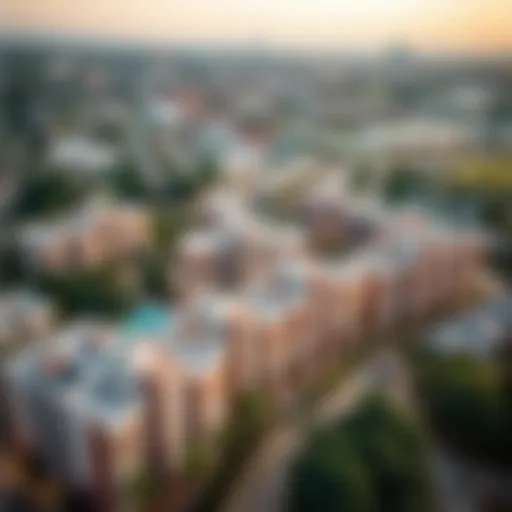Exploring the Benefits and Drawbacks of Living in Dubai


Intro
Living in Dubai is a dreamscape for many. The shimmering skyline, luxurious lifestyle, and the allure of tax-free income draw individuals from around the globe. However, it is crucial to look beyond the glitz and glamour. Understanding the reality of life in this bustling emirate requires a balanced perspective, especially for those contemplating a move or investing in its thriving real estate market.
In this piece, we will unpack various aspects of living in Dubai, diving into economic opportunities, lifestyle amenities, as well as governance and environmental considerations. The goal is to furnish potential movers, renters, and investors with insightful information. Ultimately, an informed decision hinges on a clear grasp of both pros and cons.
Dubai’s juxtaposition of modernity and tradition is both enticing and complex. A world where cultures meld seamlessly leads to a rich tapestry of experiences, but the rapid pace of change poses its challenges. Hence, let’s start our exploration with a crucial segment that sets the stage for everything else: the real estate market.
Market Insights
Current Trends in Dubai Real Estate
Dubai’s real estate market has undergone a noteworthy transformation over recent years. The pandemic temporarily turned the tide, causing a ripple in property demand; however, resilience quickly became the mantra. The latest reports indicate that the market is rebounding with vigor. Investors and homebuyers are flocking to the residential sectors, seeking properties in burgeoning areas like Dubai Marina and Downtown Dubai.
The effects of government initiatives like long-term residency visas for expatriates and low interest rates have further bolstered market confidence. People are actively looking for investment opportunities, which is evident from the consistent increase in property prices.
To illustrate:
- The rental market has seen a surge due to the influx of foreign professionals.
- Off-plan properties are becoming quite the talk of the town, as buyers seek to invest in projects that promise long-term value.
- Popular neighborhoods are experiencing quick sales, with properties often sold within days.
Economic Factors Affecting Property Prices
Several economic indicators play a pivotal role in shaping Dubai's property prices. The UAE’s strategic position as a global business hub is a primary contributor. Factors include:
- Inflation Rates: Rising living costs may affect buying decisions, squeezing some would-be buyers out of the market. However, with the right financial planning, investing in property still makes sense for many.
- Currency Strength: The strength of the dirham against other currencies can influence property appeal for foreign investors.
- Government Policies: Initiatives such as tax exemptions for expats can lower the barriers to entry for new buyers.
"Understanding these economic factors will equip you with the tools necessary for successful navigation in a competitive market."
Buying and Investing Tips
Essential Steps for First-Time Buyers
For first-time buyers, ensuring a smooth transition can be daunting. Here are pivotal steps to guide you:
- Research the Market: Dive deep into neighborhood dynamics, price trends, and future developments.
- Get Pre-Approved for Financing: Knowing your budget helps narrow down your options efficiently.
- Engage a Reliable Real Estate Agent: Local expertise can save time and mitigate risks.
- Visit the Property: Pictures can be deceiving; visiting ensures the area and property meet expectations.
Financing Options and Investment Strategies
Financing is a critical component of purchasing property. Options generally include:
- Mortgages: Most banks offer competitive mortgage rates with varying terms.
- Developer Financing: Often available for off-plan properties, sometimes with attractive payment plans.
- Cash Purchases: If liquidity allows, cash transactions may speed up the buying process and offer negotiating leverage.
Strategically, knowing when to buy can determine your long-term satisfaction. Look out for market dips, as these can present excellent opportunities to snag properties at lower prices.
Prolusion to Dubai as a Living Destination
Dubai, with its skyline that cuts through clouds, has turned into a catch-all term for luxury and opportunity. But what lies beneath the glitz? Understanding Dubai as a living destination is essential for anyone thinking about making the leap to this bustling metropolis. It’s not just a popular vacation spot; it’s a hub of economic activity, a melting pot of cultures, and a place where the unusual feels everyday.
The positive parts of living in Dubai catch the eye first: zero personal income tax, a high standard of living, and a broad array of services and entertainment options. These facets attract expats from all corners of the globe, each hoping to improve their lives in some way and introduce their families to an environment that, in many cases, is vastly different from their home countries.
However, living in Dubai is not all sunshine and shimmering skyscrapers. There are challenges too, such as high living costs, extreme weather conditions, and cultural adjustments. It’s important to strike a balance between the gleaming exterior and the underlying complexities that could affect your quality of life.
When considering a move to Dubai, one must reflect on personal priorities: Is a tax-free income worth the expense of housing? Does the lifestyle trump the occasional rigidness of local customs? These reflections are not just about evaluating facilities or benefits but understanding and integrating into the societal fabric of Dubai.
In short, this section sets the scene for what living in Dubai can profess to offer. The opportunity is vast, but so are the adjustments one must navigate. In diving deeper into subsequent sections, this article will shed light on both the attractions and the hurdles of life in Dubai, ultimately aiming to arm you with enough knowledge to make an informed decision.
Economic Advantages of Living in Dubai
Living in Dubai offers a complex tapestry of economic benefits, making it a hotspot for investors, entrepreneurs, and professionals alike. What sets Dubai apart is its distinctive blend of a tax-free environment and a booming job market. This section explores the economic framework that supports these advantages, highlighting the specific elements that contribute to its allure as a living destination.
Tax Benefits
One of the most alluring aspects of residing in Dubai is the tax-free status enjoyed by individuals and businesses. Personal income tax is virtually non-existent, meaning your hard-earned money stays in your pocket, enabling a lifestyle that may be unattainable elsewhere. This lack of taxation can lead to significant savings over time. For families, this translates into more opportunities for education, healthcare, and leisure activities, thus enhancing overall quality of life.
Additionally, corporate tax regulations are incredibly favorable, making it easier for entrepreneurs to flourish. Many companies established in Dubai's free zones may also enjoy 100% foreign ownership, a privilege that isn’t easily found globally. Often, taxes are minimal or entirely nonexistent. Just imagine keeping what you earn while enjoying the services you rely on. As a result, businesses can reinvest profits back into growth instead of sending a chunk off to the taxman.
Job Market Opportunities
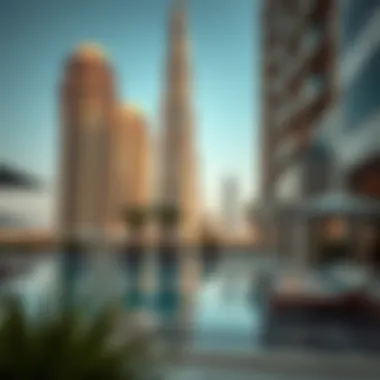
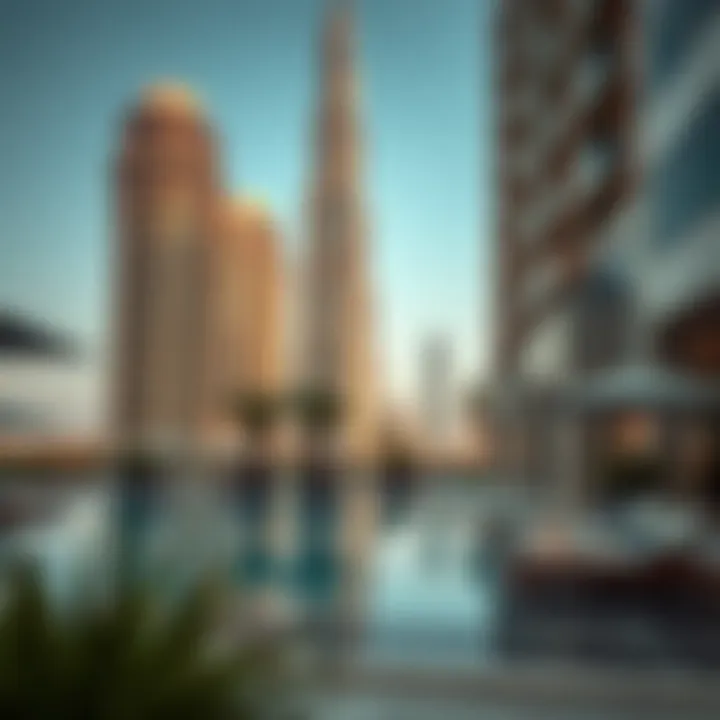
Dubai's job market is thriving, primarily due to its diverse economic landscape. With a strong focus on sectors like tourism, finance, technology, and real estate, the city offers abundant employment opportunities for individuals across various fields. Companies are constantly on the lookout for skillful professionals who can contribute to an economy that is constantly evolving.
In addition, the city hosts numerous international firms that seek talent from around the globe. This presents a unique advantage for expatriates, offering not just a chance to find work, but also the opportunity to build a diverse network of contacts. Networking events and trade shows, such as GITEX Technology Week, are common, facilitating connections between job seekers and employers. The result is a cosmopolitan labor market that is often buzzing with activity.
"Dubai is not just a place to live; it’s a gateway to opportunities that can propel your career or business forward."
Robust Business Environment
Dubai's business environment, often touted as one of the best in the world, is characterized by its ease of doing business. The government has implemented numerous reforms aimed at simplifying the process for new ventures. From streamlined licensing procedures to accessible permits, the framework is set up to encourage entrepreneurship.
Furthermore, Dubai offers various incubator programs and initiatives aimed at supporting startups. These platforms provide guidance and often financial support, paving the way for innovation and new ideas. co-working spaces are also abundant, allowing entrepreneurs to collaborate and share resources without the overhead costs of traditional offices.
Aside from infrastructural support, the city acts as a central hub for access to markets in the Middle East, Africa, and Asia. Dubai’s strategic position means businesses can reach a vast client base while enjoying high-quality connectivity through world-class logistics networks. This makes it a smooth ride for companies looking to expand their reach beyond local territory.
In summary, considering the tax benefits, job market opportunities, and robust business environment, living in Dubai offers a strong economic foundation that speaks to a variety of lifestyles. Whether you're an ambitious professional, an investor eyeing promising markets, or an entrepreneur ready to make your mark, Dubai holds something valuable for everyone.
Cultural and Lifestyle Highlights
When we talk about living in Dubai, one cannot overlook the cultural and lifestyle highlights that make this city a truly unique destination. These aspects play a vital role in shaping the everyday experiences of residents. From diverse communities to luxurious amenities, the cultural fabric of Dubai is a tapestry that draws in people from various backgrounds and influences. This section delves deeper into these highlights, underscoring why they are integral to understanding life in this vibrant metropolis.
Diverse Community and Multiculturalism
Dubai stands as a beacon of multiculturalism. The city is home to over 200 nationalities, which results in a rich melange of traditions, customs, and lifestyles. This diversity is reflected not only in the culinary scene, offering dishes from all corners of the globe but also in festivals, art, and social events. Residents have the unique opportunity to immerse themselves in different cultures without ever leaving the city.
Culinary festivals featuring global cuisines, exhibitions showcasing a multitude of artistic expressions, and even social gatherings like neighborhood events contribute to a sense of belonging among expatriates. It’s quite normal to walk through areas like Global Village and hear a mélange of languages—that’s the pulse of Dubai.
In fact, this mix of backgrounds leads to a mindset that embraces differences and fosters a sense of community. New residents might find that neighbors are often eager to share their customs, making it relatively easy to navigate the sometimes-overwhelming cultural landscape. This congenial spirit is something many expatriates appreciate as they settle into life in Dubai.
Luxurious Amenities and Services
Living in Dubai often means indulging in luxury. The city is dotted with five-star hotels, high-end shopping malls, and exquisite dining options. Palm Jumeirah, for instance, is famous not just for its stunning coastline but also for its upscale resorts and fine dining establishments such as Nobu. In Dubai, treating oneself to a gourmet meal or a lavish spa day is considered the norm, not the exception.
Moreover, the development of infrastructure plays a crucial role in enhancing residents’ quality of life. Advances in public services, like secure and responsive healthcare systems, or the approach taken to urban planning, ensure a lifestyle filled with convenience and comfort. The presence of entities like Dubai Health Authority, which upholds stringent health regulations, helps reassure residents of high-quality healthcare resources.
"Luxury is the standard in Dubai, and that's reflected in every aspect, making daily life feel exceptionally indulgent."
Entertainment and Leisure Activities
To say there's a lack of entertainment options in Dubai would be quite the understatement. The city prides itself on a dynamic host of leisure activities that cater to a myriad of interests. From world-class sporting events, such as the Dubai Tennis Championships, to cultural spectacles like the Dubai Opera, there’s never a dull moment.
For outdoor enthusiasts, activities abound. Whether it's a weekend spent at Jumeirah Beach, leisurely strolls through the Ras Al Khor Wildlife Sanctuary, or adrenaline-pumping experiences like skydiving over the Palm, the choices are vast. Additionally, with venues like Dubailand and the myriad theme parks springing up, families find themselves spoiled for choice.
Moreover, social life thrives in Dubai, with an array of bars, nightclubs, and lounges that offer entertainment until the wee hours. Festivals, concerts, and exhibitions regularly grace the event calendars, ensuring that the social scene is always vibrant.
In summary, cultural and lifestyle highlights in Dubai create a unique atmosphere that is both welcoming and exhilarating. From the diverse community to luxurious services and abundant entertainment, residents are sure to find aspects of daily life that not only meet their expectations but also enhance their living experience.
Infrastructure and Connectivity
When considering a move to a bustling metropolis like Dubai, one cannot overlook the paramount importance of infrastructure and connectivity. This city has experienced an impressive transformation over the past few decades, evolving into a global hub not only economically but also in terms of its infrastructure. The ease of movement and the availability of services significantly shapes the quality of life for residents. Let’s delve deeper into the components that define Dubai’s infrastructure and connectivity, examining how they contribute to the allure of the city.
Public Transport System
Dubai’s public transport system is a marvel of modern engineering and planning. With options ranging from the efficient Dubai Metro to extensive bus and tram networks, commuting in the city has never been easier. The metro, in particular, boasts state-of-the-art facilities, offering a clean, safe, and punctual mode of transport that connects various points of interest across the emirate. Here are a few key points regarding the public transport system:
- Affordability: Fares are generally reasonable, making public transit an appealing choice for both expatriates and locals.
- Accessibility: Stations are designed to accommodate individuals with varying mobility needs, ensuring inclusivity.
- Environmental Considerations: The metro runs on electricity, contributing to a reduction in the city’s carbon footprint compared to traditional vehicles.
In a city known for its rapid pace, the public transport system minimizes travel time, allowing residents to maximize their productivity and leisure time alike.
Road Infrastructure and Accessibility
Dubai’s road infrastructure is equally impressive, characterized by wide highways, well-maintained roads, and innovative traffic management systems. This robust network enables smooth transit throughout the city and beyond. The strategic design of roads aids in minimizing congestion and enhances accessibility to various neighborhoods and key locations.
- Multiple Routes: A plethora of routes means there's generally a way to dodge the traffic and get to your destination more swiftly.
- Signage Prevalence: Clear signage in multiple languages ensures that both residents and visitors can navigate with ease.
- Connection to Major Highways: Dubai is well-connected to significant arterial highways like Sheikh Zayed Road, facilitating travel to other emirates and enhancing trade and tourism.
As a resident, one finds that the efficient road infrastructure plays a vital role in daily life, promoting ease of access to essential services and social hubs.
Proximity to Global Destinations
Dubai’s geographical positioning makes it a gateway to several international destinations, a notable advantage for both business and leisure travelers. The city is well-served by Dubai International Airport, which ranks among the busiest airports worldwide, offering flights to hundreds of destinations across the globe. This proximity has several implications:


- Business Opportunities: Easy access to international markets allows businesses to thrive, making Dubai an attractive base for entrepreneurs and multinational corporations.
- Cultural Exchange: The influx of tourists means a vibrant exchange of cultures, enriching the social fabric of the city.
- Travel Convenience: For residents, the ability to reach popular vacation spots within a few hours enhances life quality with diverse travel options.
As you weigh your options for living in Dubai, consider the exceptional infrastructure and connectivity that characterize this dynamic city. These features alone can make a compelling case for your relocation, promising a lifestyle that balances convenience and accessibility.
Social Dynamics and Community Life
Understanding the social dynamics and community life in Dubai provides key insights into what it means to live in this bustling metropolis. In a place that stands as a melting pot of cultures, being aware of the community nuances is essential for anyone considering making Dubai their home. This section will highlight three critical aspects: safety and security, family-friendly environments, and healthcare quality and access.
Safety and Security
One of the foremost concerns for anyone thinking about moving to a new place is safety. In Dubai, this is often touted as one of the safest cities globally. With a low crime rate, residents generally feel secure in their daily lives. The local police force, known for its visibility and responsiveness, plays a significant role in maintaining this safety. Citizens and expats alike can enjoy a sense of freedom, from late-night strolls along the marina to family outings in crowded markets.
However, safety isn’t just about crime statistics; it’s also about feeling secure in your own neighborhood. Many expatriates have reported a comforting sense of community, where neighbors look out for one another. Additionally, modern surveillance systems and strict regulations contribute to an overall environment that is conducive to peace of mind.
Family-Friendly Environment
For those with families, Dubai proves to be an appealing choice. The city is designed with the family unit in mind, boasting numerous parks, recreational areas, and educational institutions. Schools here are often international, offering diverse curricula that cater to various nationalities. This emphasis on education reflects the city’s commitment to nurturing the next generation.
"Families in Dubai enjoy a myriad of activities - whether it's enjoying a day at the desert rangelands or exploring the educational exhibits in local museums."
On top of that, community initiatives frequently focus on family engagement, from organized festivals to seasonal events at local malls. Such offerings help create a lively and engaged atmosphere where families can bond over shared experiences. Moreover, many neighborhoods are equipped with family-friendly amenities, such as playgrounds and child-care facilities.
Healthcare Quality and Access
When weighing the pros and cons of life in Dubai, access to quality healthcare certainly makes the city stand out. The healthcare system in Dubai meets high standards, with both public and private hospitals equipped with state-of-the-art technology. Expatriates often share positive experiences regarding the quality of care they receive, albeit with the understanding that costs can vary significantly between public and private facilities.
Dubai’s healthcare system also offers an array of specialized services, which caters to diverse medical needs, ensuring that residents have access to holistic care. Furthermore, many clinics and hospitals operate 24/7, making healthcare accessible even at odd hours.
In short, the social dynamics and community life that characterize Dubai underscore a unique blend of security, family engagement, and healthcare access. These elements work together to create an environment that is not only livable but thrives on a sense of community, which ultimately enhances the overall experience for residents.
Challenges of Living in Dubai
Living in Dubai is often depicted as a dream come true, full of glitz and glamour. However, it’s crucial to peel back the layers to understand the genuine challenges that accompany such an extravagant lifestyle. Recognizing these hurdles not only prepares prospective residents but also empowers them to make informed decisions, whether they are considering a house purchase or simply weighing the day-to-day realities of life in the city.
High Cost of Living
One cannot discuss Dubai without mentioning its cost of living, which can be eye-watering at times. While the city offers a high standard of living, this comes with a price tag. Housing costs are notorious, with prices varying significantly depending on the location, type, and amenities available. For instance, apartments in the bustling Dubai Marina can set you back significantly compared to those in suburban areas like Jumeirah Village Circle.
The cost of groceries and dining out also tends to be on the higher end, as much of the food is imported. This can lead to a notable hit on a monthly budget. Yes, you might enjoy fine dining at a world-class restaurant, but your bank account may feel the pinch the morning after.
- To give you an idea, here’s a brief breakdown:
- Rent for a 1-bedroom apartment in the city center can reach approximately AED 8,000 to AED 15,000 per month.
- A meal at an inexpensive restaurant might cost around AED 60, while dining at a mid-range place can easily exceed AED 300 for two.
Navigating these financial demands is essential for anyone looking to settle in Dubai.
Climate and Environmental Considerations
Next up, let’s chat about the climate—it’s not without its quirks. With scorching summers and mild winters, Dubai typically bakes under the sun for much of the year. Temperatures can climb to an uncomfortable 45 degrees Celsius (113 degrees Fahrenheit) or higher, particularly in July and August. For those unaccustomed to the heat, it can be quite an adjustment.
Living in such conditions necessitates being strategic about outdoor activities and of course, heavy reliance on air conditioning. Unfortunately, this increases energy costs, pushing the monthly bills even higher. The environmental impact of such energy consumption cannot be overlooked; it’s a challenge that Dubai faces continually as it seeks to balance development with sustainability efforts.
"A dwelling's comfort often lies in its adaptation to the elements; hence, understanding the climate is a necessity."
Cultural Adjustments and Regulations
Cultural differences can be both enriching and challenging. Dubai is a melting pot of different cultures, which adds to its charm but also necessitates adjustments for newcomers. Expats often need to navigate differing social norms and traditions. Respecting local customs is not just a courtesy—it’s a matter of personal and legal safety.
Moreover, understanding regulations—especially related to residency and business—can be baffling. The legal framework often seems daunting, with various requirements for work permits, business licenses, and property ownership.
- A few points to remember:
- The laws around alcohol consumption, dress codes, and public behavior are strictly enforced.
- Being well-acquainted with your rights and responsibilities as an expat is vital.
Real Estate Landscape and Property Market
When considering life in Dubai, the real estate landscape serves as a pivotal element of both the economy and the overall living experience. The dynamic property market is more than just bricks and mortar; it reflects the emirate's ambitions, fluctuations, and the global interest this vibrant city commands. Understanding the nuances of this market canprovide valuable insight for investors, homeowners, and renters alike. The real estate sector isn’t just about finding a roof over one’s head; it’s a barometer of economic health and a facilitator of lifestyle choices.
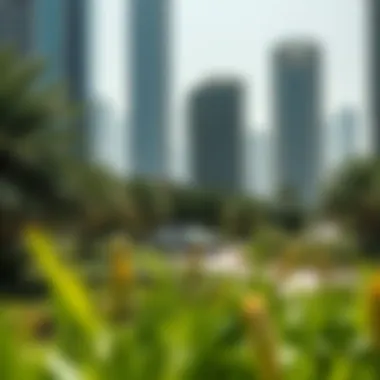
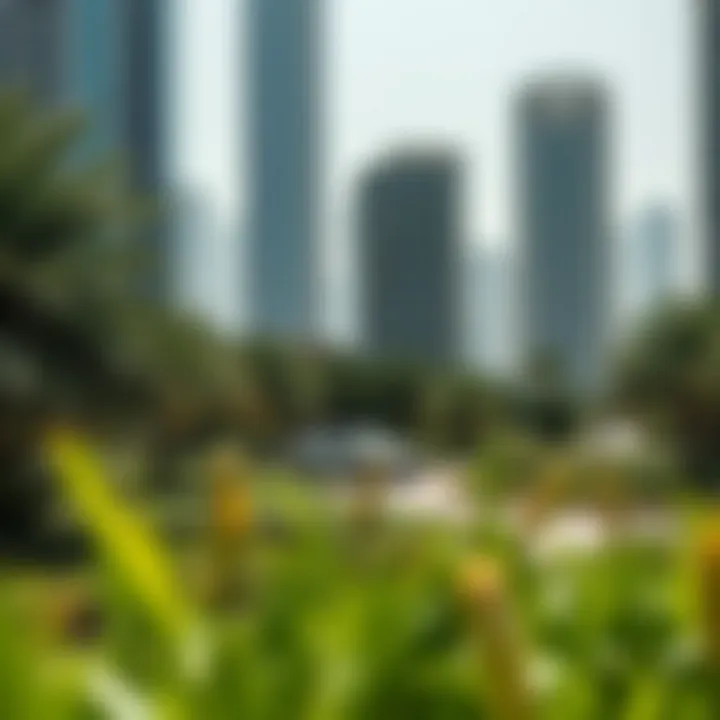
Trends in Property Prices
The property price dynamics in Dubai reveal a complex picture influenced by numerous factors. Recent years have shown a rising trend in property values, driven by sustainable economic growth and an influx of expatriates. Not only are local developments emerging, but the revival of tourism post-pandemic has bolstered demand across various segments, from luxurious villas to high-rise apartments. However, it’s prudent to approach these figures with a discerning eye; fluctuations can occur because of regulations, investment inflows, or economic policies implemented by the government.
For instance, The Dubai Land Department (DLD) reported a significant increase in property transactions, which hints at a robust investment environment. However, potential buyers should also keep an ear to the ground regarding market corrections or adjustments in regulations that might affect prices. Investing in the property market entails a degree of risk, and being informed is half the battle won.
Rental Market Insights
The rental market in Dubai is particularly intriguing, offering a mix of satisfaction and challenges for both landlords and tenants. As the expat population is on a continual rise, demand for rental properties goes hand in hand with the fluctuations in property prices. Landlords often face the intricate task of balancing appealing rental rates with maintaining their property value.
When dissecting the various districts, areas like Dubai Marina and Downtown Dubai showcase higher rental prices due to their prime locations and luxury amenities, while areas further from the city center, though often marginally less costly, may not offer the same quality of life and accessibility. Therefore, prospective tenants must engage in careful evaluations, weighing both price and location before signing on the dotted line.
"Finding the right property in Dubai is more of a marathon than a sprint; timing and location can make all the difference."
Investment Opportunities in Emerging Areas
Emerging areas of Dubai, such as Dubai South and the Dubai Creek Harbour, are not just dotted lines on a map; they embody future potential and opportunity. For savvy investors, these neighborhoods often provide excellent value, especially when contrasted against more established locales like Jumeirah or Palm Jumeirah.
The government’s investment plans for these areas indicate a promising long-term growth trajectory. Infrastructure improvements, communal facilities, and planned accessibility via public transport position these areas as attractive hubs for the next wave of development. Investors can indeed reap significant benefits by focusing on these up-and-coming neighborhoods.
Legal Framework and Residency Requirements
Living in Dubai necessitates an understanding of its legal framework and residency requirements. These components are crucial because they shape the experience of expatriates and investors alike. Anyone contemplating a move here must familiarize themselves with the rules governing residency, employment, and property ownership. Understanding these regulations not only helps to avoid potential legal pitfalls but also clarifies the rights and obligations of residents, thus making the transition seamless.
Visa Regulations for Expats
Visa regulations in Dubai are tailored to encourage economic participation and attract talent from around the globe. There are various types of visas available, including work visas, investor visas, and family sponsorship visas. Each type has specific criteria and documentation requirements that one must meet.
- Work Visa: Typically, this is sponsored by an employer. It allows expats to reside and work legally in Dubai. To obtain this visa, a job offer is essential, and the employer must navigate several responsibilities, including medical testing and labor approvals.
- Investor Visa: This visa is designed for individuals who wish to invest a significant amount in the UAE economy, often through property purchases or business investments.
- Family Sponsorship Visa: Expats with residency can sponsor family members to live in Dubai. This process requires proof of sufficient income and appropriate accommodation.
Navigating the visa landscape can be a bit of a maze, but with the right guidance, it can lead to an enriching experience in a dynamic city like Dubai. An effective tip is to stay updated with official resources, as policies change frequently. For detailed conditions, visiting the UAE government’s portal can be very helpful.
Understanding Property Ownership Laws
When it comes to property ownership, Dubai has made significant strides toward being more accessible for foreign investors. However, understanding the nuances of property law is critical. Foreigners can own property in designated areas, known as freehold areas, which include popular locations like Palm Jumeirah and Dubai Marina.
- Freehold Ownership: This allows full ownership of the property. Investors can buy, sell, or lease their property without restriction.
- Leasehold Ownership: In some areas, foreigners can hold a leasehold for a specified number of years, typically up to 99.
- Regulations: Investing in property requires careful attention to the laws surrounding real estate transactions, such as RERA guidelines and understanding registration fees, which can add to the cost of purchasing property.
It's vital to consult with legal experts or real estate professionals who know the local laws, as this ensures compliance and protects your investment. Being part of the Dubai real estate market can lead to lucrative opportunities, but knowledge is key to making informed decisions.
"Knowledge of local laws, from visa regulations to property ownership, empowers investors and expats to thrive in Dubai’s vibrant landscape."
In summary, understanding Dubai's legal framework and residency requirements is foundational for a smooth transition and successful integration into this global city. By comprehensively grasping the visa options and property ownership laws, potential residents and investors can mitigate risks and position themselves for success within Dubai’s dynamic environment.
Closure: Assessing the Balance
Living in Dubai presents a complex array of benefits and challenges, making it crucial for potential movers or investors to weigh these factors thoughtfully. This section aims to clarify the various elements that must be considered when deliberating a life in this vibrant city. From tax advantages and job possibilities to environmental conditions and cultural adjustments, each aspect contributes significantly to the overall experience of calling Dubai home.
When one thinks of the allure of Dubai, the first thing that usually springs to mind is its remarkable skyline and luxurious lifestyle. But behind the glitter, there are noteworthy complexities tied to daily living. An individual’s or family’s priorities—be it financial, social, or personal—often dictate how they perceive these advantages and hurdles.
"Finding a home in the desert might feel like a dream, yet the sandstorms can dampen the thrill. It’s a trade-off worthy of contemplation."
Weighing Benefits Against Drawbacks
Every silver lining has its cloud, and this holds true in Dubai. The benefits, such as a tax-free income and job diversity, are compelling reasons for many. However, these benefits often come packed with drawbacks. For instance, while the lifestyle can be opulent, the cost of living can be staggering, an aspect that requires careful financial planning. Moreover, the sweltering desert climate can be a heavy burden, especially for those unaccustomed to extreme temperatures.
- Pros:
- Cons:
- Tax-free income
- Robust job market
- High standard of living
- Sky-high living costs
- Harsh climate conditions
- Cultural adjustments
The delicate act of balancing these benefits against the downsides often shapes one's experience in Dubai. Individuals must introspect their lifestyle preferences, work expectations, and family needs. Thus, reaching an equilibrium that feels right may take time and requires a willingness to adapt to this ever-evolving city.
Making Informed Decisions for Investment
For those keen on investing in Dubai's real estate market, being well-informed is non-negotiable. Potential buyers should delve into factors such as location trends, impending developments, and fluctuations in property values. Taking the economic climate into account is equally essential, as insights into current market conditions can hugely affect decision-making.
Furthermore, prospective investors should bear in mind the cultural and legal framework that comes with property ownership in Dubai. Understanding residency requirements and local laws will not only ease the buying process but also prevent unforeseen complications later on.
- Key Considerations:
- Understanding the nuances of local regulations
- Keeping an eye on market trends
- Evaluating personal motivations for investment
In essence, whether one is looking to move or invest, the journey involves much more than simple logistics—it's about aligning one’s aspirations with the realities of life in Dubai. This desire for thorough comprehension must, thus, drive each decision, ultimately leading to a more rewarding living experience.

